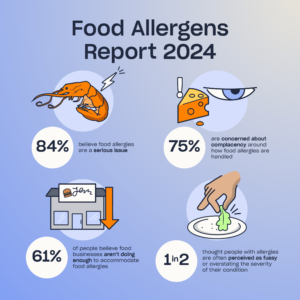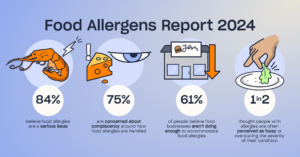More than three quarters of people in Wales think that complacent attitudes pose a danger to those with allergies, new research from training provider High Speed Training reveals.
The survey, which forms part of the Safe to Serve report, polled over 2,000 UK adults to highlight levels of awareness and understanding of food allergies and hypersensitivities, and the impact that hypersensitivities have on daily life.
The survey shows that across Wales, 77% of people are concerned about complacency around how food allergies are handled in eateries, and that 64% of respondents believe food businesses should do more to cater to people with food allergies. Based on the results, it’s evident that the reality of eating out for those with food allergies can be a stress-inducing and ostracising affair, and the public are calling for change.
As a leading provider of Food Allergen Awareness training, High Speed Training’s latest report aims to raise awareness of the importance of food businesses having the correct practices in place to help safeguard customers with food allergies. Out of those surveyed, 84% of people in Wales believe allergies are a serious issue, yet 52% think that people with allergies are often perceived as fussy or overstating the severity of their condition. This is a stigma that needs to be broken, as allergy safety is, for so many people, a matter of life and death..
The report also reveals that food allergies in the UK are a growing epidemic, with younger generations far more likely to develop a food allergy than ever. Over 2 million people in the UK have a diagnosed food allergy, and out of those 25% will at some point experience a severe anaphylactic reaction [1]. Furthermore, 1 in 5 live in fear of death by anaphylactic shock.[2]
This fear is not unfounded, as evidenced by numerous deaths resulting from a lack of allergen awareness in eateries. Owen Carey tragically lost his life to an allergic reaction after dining out in 2017 due to a lack of clear allergen labelling and communication amongst restaurant staff.
Since Owen’s death, the Carey family have founded the Owen’s Law Campaign, which seeks to mandate allergen labelling on restaurant menus and advocates for proactive communication between restaurant staff and customers regarding potential allergens, alongside thorough staff training in allergen awareness.
Recently, the Food Standards Agency (FSA) have openly backed the measures called for by the Owen’s Law Campaign and have written to make this recommendation to Ministers in England, Wales and Northern Ireland who are responsible for taking this forward. Despite this progress, there’s still a long way to go as the danger for allergy sufferers eating out is still very real.
High Speed Training, whose Food Allergen Awareness course is the first to be endorsed by the Owen’s Law Campaign, offers key advice in their report for businesses to help ensure they’re following best practice when it comes to allergy safety. A third of people surveyed had, or knew someone close to them with, a food allergy, meaning a large portion of group bookings will be dependent on restaurants safely catering for those with allergies. While it may initially seem overwhelming to have appropriate safety precautions in place that manage food allergens effectively, High Speed Training emphasises that a number of small actions will have a big impact.
Dr. Richard Anderson, Head of Learning and Development at High Speed Training, says: “Food businesses have a responsibility to follow best practice when it comes to allergen safety, as ultimately lives are at risk. Despite recent development in allergy safety regulations such as Natasha’s Law, our report shows that there is still a long way to go in providing customers with food hypersensitivities with safety and confidence whilst dining.”
“For food businesses, catering to all potential customers, regardless of dietary requirements, will be beneficial in increasing the amount of potential customers and the quality of service they receive. Regardless of the advantages to business, taking all possible measures to safeguard customers with hypersensitivities is the right thing to do given the potential consequences.”
“Promoting effective communication amongst staff and with customers, completing thorough food allergen training, and displaying accurate allergen information are three key actions food businesses should take to ensure the safety of your customers and to comply with future changes expected in the industry.”
To view the report in full, and to learn more about the reality of eating out with a food allergy, please click here.

| [donate]
| Help keep news FREE for our readersSupporting your local community newspaper/online news outlet is crucial now more than ever. If you believe in independent journalism,then consider making a valuable contribution by making a one-time or monthly donation. We operate in rural areas where providing unbiased news can be challenging. |
























